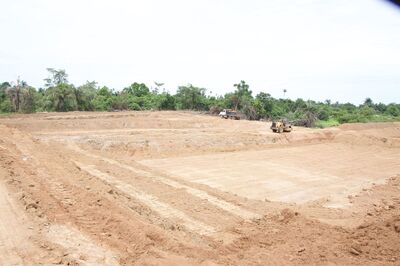Lagos boosts food production with aquaculture centre
By Gbenga Akinfenwa
As part of strategies aimed at bridging the country’s fish deposit gap, the Lagos State government has launched an aquaculture centre to revolutionise the sector by boosting fish production, create jobs, and enhance food security in the state and beyond.
As at last year, the country’s fish deficit stands at 2.5 million metric tonnes, amid 3.6 million tonnes yearly demand. To bridge this production gap, stakeholders say Nigeria will need to raise 400,000 new fish farmers.
The Lagos Aquaculture Centre for Excellence (LACE) initiative – a Joint Venture Agreement (JVA) between the Lagos State government and Dula Agro-Services Limited, located on 35 hectares of land in Igbonla, Epe, is designed to serve as production facility for fish fingerlings, processing, and as an off-take facility for all fish farmers in Lagos. It is expected to be commissioned in the third quarter of 2026.
With a projected capacity of about 50 million fish fingerlings yearly, the centre will equally supply 5,000 smallholder farms, significantly contributing to the state’s food security.
The key features of the centre are a 50-million fish fingerlings hatchery; 24,000-tonne feed mill, and a 20,000-tonne fish processing centre, considered as the first of its kind not only in Lagos but the country at large.
While conducting journalists on a tour of the facility, the Commissioner for Agriculture and Food Systems, Abisola Olusanya, who revealed that the aquaculture centre will serve as an off-taker for fish farmers in the state, added that the facility will also handle processing, upward distribution and marketing for fish production.
She said the intention of Governor Babajide Sanwo-Olu is to make fish affordable for Lagosians with the Public-Private Partnership (PPP). “It’sa partnership with the private sector, Dula Agro and the Lagos State Government. It’s situated on 35 hectares of land. There’s a road between the facility. You have about 12 hectares on this side, and about 23 hectares on the side of the road,” she explained.
Related News
Lagos to create 1,000 jobs with aquaculture centre
Experts seek environmentally friendly regulations, policies in FCT
‘Boosting food production crucial for farmers survival in Edo’
Olusanya noted that the project was also borne out of the fact that the state is surrounded by many fish farmers and young people who would like to upscale, but lack of off-takers is limiting their efforts. “They end up having to sell their fish with minimal margins or with no margins at all, and that can be very discouraging. So, facilities like this, where price can be agreed before production with efficient off-taker arrangements and signed MoUs, I believe it would help to bolster our fishing businesses.”
She added that the project will position the state as a top exporter of quality fish, bolster food sustainability, and double food production.
The Chief Executive Officer of Dula Agro Services, Ifedolapo Atinmo, disclosed that the facility will host 10 ponds with water flowing from the Osun River. “Before we settled on this particular site, we worked closely with the Lagos Ministry of Agriculture and visited about seven different locations. We tested the water samples, which flows all the way from the Osun River, and found that it is quality and perfect for our fish production.
“Each of the 10 ponds will hold 72,000 fish, with a batch harvest capacity of an average of 60 to 65 tonnes. In terms of employment, this project should be able to produce about 250 direct jobs on our production side, while our feed mill processing unit will provide 150 jobs.”
He noted that at full functioning capacity, the LACE can contribute N50m to Nigeria’s Gross Domestic Product (GDP), adding that so far, the state has spent an average of N10b on the project.
On his part, the Chairman of the LACE board, Rotimi Erogbogbo, said the project speaks of Lagos’ culture of wealth and sustainability creation. “The whole idea is to ensure that we can meet the fish requirements of Lagos State and indeed the entire country.” He stressed that for a country with vast arable land and water bodies, Nigeria has no business importing 70 percent of its fish needs.
“This presents a great opportunity for our youths, entrepreneurs, and farmers in Lagos. The reason many youths run away from agriculture is because they didn’t have good examples,” he said.













